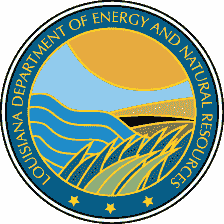Technology Assessment Division
TECHNOLOGY ASSESSMENT DIVISION
Energy Efficiency & Renewable Energy Activities
Louisiana Overview
The Louisiana Department of Energy and Natural Resources (DNR), Technology Assessment Division (TAD) is the technical arm of the Office of the Secretary and serves as the State Energy Office. Our mission is to promote and encourage the exploration, production, conservation and efficient use of energy and natural resources in order to improve the environment, enhance economic development and insure a better quality of life for this and future generations.
Through the joint efforts of federal, state, and local governmental bodies including the Louisiana state energy office and private industry, Louisiana now breathes the cleanest air in over a generation. On January 13, 2009, the EPA Region VI office certified that for the first time in Louisiana history, the state meets all federal ozone standards for the original one-hour standard and the eight-hour ozone standard that is in effect until 2010.
The DENR continues to provide assistance statewide to those having to rebuild after hurricanes Katrina, Rita, Ike, and Gustav on an ongoing basis. In addition to providing a variety of other resources to citizens, DENR has made available thousands of copies of the very popular “Quick Notes on Achieving Energy Efficiency,” and “Builder’s Guide to Energy Efficient Homes in Louisiana” through the Road Homes offices. DENR has provided guidance to numerous agencies and entities on developing energy efficiency and renewable energy strategies and policies.
In addition, speakers, reports, and tours have been given on construction practices and recovery efforts. Most recently, DENR hosted a tour for international visitors from the United States and International Association for Energy Economics conference that focused on the growth of the energy industry.
Residential
DNR’s ongoing Home Energy Rebate Option Program (HERO) offers a cash rebate of up to $2,000 to Louisiana homeowners that renovate their homes to meet a high level of energy efficiency. This program has won the EPA’s Energy Star high achievement award for six years in a row. Staff trains, certifies, and provides quality control over energy raters that practice statewide. The DENR program is accredited through the Residential Energy Services Network (RESNET). Louisiana Home Energy Raters are private sector entities that operate independently through funds charged to the homeowner for the energy rating. Since inception, 17,025 rebates totaling $23,953,477 have been issued. The program is included as a voluntary measure in the State Implementation Plan submitted to EPA to reduce pollutant emissions in the state.
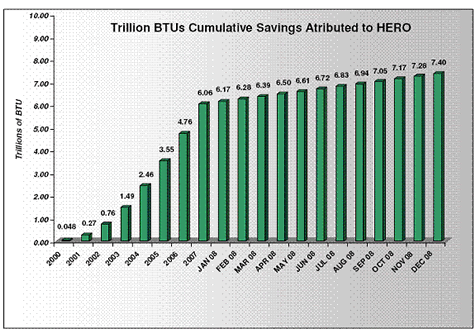 |
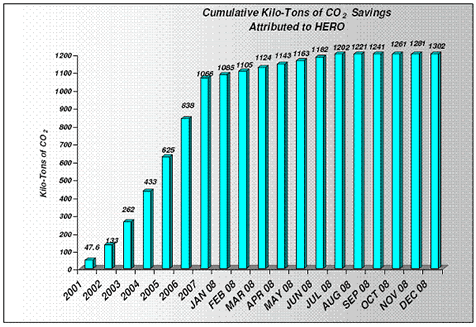 |
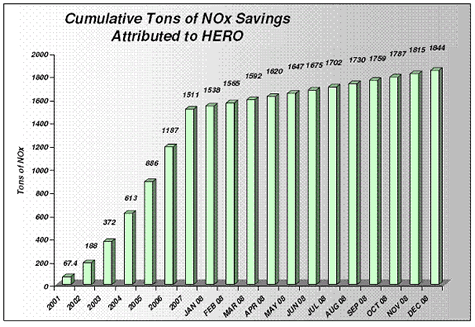 |
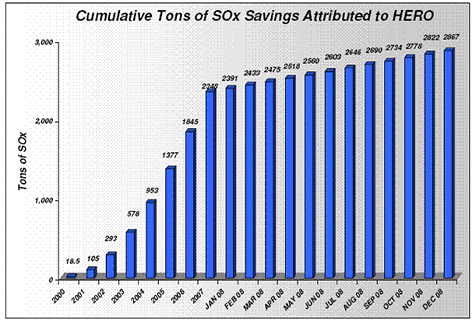 |
|
DENR also administers the Home Energy Loan Program, which has recently been modified to address highly efficient technologies to include off-the-shelf technologies. Since inception, HELP loans totaling $842,155 have been issued. The NBC Sci-Fi channel awarded a Baton Rouge homeowner an energy efficiency makeover. After measures were installed by numerous donors, DENR provided a detailed Home Energy Rating which quantified an overall energy efficiency upgrade of 36 percent. Institutional Seventeen projects executed under the DENR’s Energy Fund for energy performance contracts in public buildings leveraged $65 million in guaranteed energy savings from a $3.6 million investment and $34 million in private funding. The annual emission reductions achieved because of these projects equate to 61 tons of Sox (oxides of sulphur), 41 tons of Nox (oxides of nitrogen), and 14,000 tons of CO2. DENR assisted the Division of Administration with the development of a database to capture each agency’s information. Hurricanes Katrina and Rita later changed the focus of the Office of State Buildings to recovery issues. Enhancements to the facility management program were made while other scope items were deferred. With such a large volume of state funded facilities being renovated or replaced, the Louisiana Legislature passed Act 270 in the 2007 Regular Session. Act 270 requires that all state-funded major facility projects meet higher energy efficiency standards and be designed, built, and certified to exceed the state energy code requirements by at least 30% when the increase is determined to be cost effective based on a 30 year life-cycle cost analysis. On January 3, 2008, Governor Bobby Jindal issued Executive Order BJ 2008-8 instructing state agencies to become leaders in energy efficiency, conservation, and green government. DENR and the Department of Environmental Quality are providing other departments with best methods and practices regarding energy efficiency and conservation and the benefits of adopting such practices. Renewables The DENR is working with the administration in the development of a campaign to educated citizens on the Geaux Green program to expand statewide. DENR is providing ongoing leadership with comprehensive offshore wind energy studies and analysis regarding how renewables may be incorporated into future renewable portfolio standard legislation and utilizing green pricing as an alternative. DENR initiated legislation passed by the Legislature in 2005 to enable the state to lease offshore acreage for wind power development. Currently, a GIS database on potential biomass opportunities is being developed for analysis of availability of resources. In addition, the Public Service Commission adopted rules for net metering in 2005, and the New Orleans City Council has adopted the same net metering rules for the New Orleans area. Act No. 371 was passed during the Regular Session of 2007 to provide for a residential tax credit against the income tax for the cost of purchase and installation of a wind energy system and/or solar energy system. The promulgation of rules, once finalized, will make Louisiana’s legislation the most generous of any tax credits available in the country. DENR powered a 52” big screen television and satellite station over an eleven day period during Baton Rouge’s popular annual state fair. During turbulent weather the electricity supplied to the fair went down, but the solar display remained up and running providing the visitors with a real time example of how to stay powered up even when the grid goes down. Energy Codes The DENR has played a lead role in the initiation and passage of energy codes for buildings in Louisiana. In 1997, the Louisiana Legislature passed the Commercial Building Energy Conservation Code (CBECC). Based on ASHRAE 90.1-1989 (American Society of Heating, Refrigeration and Air-Conditioning Engineers Standard 90.1-1089), our office reported a total savings of 39 trillion Btu since passage. This equates to reductions in emissions totaling 23,126 tons of Sox, 14,821 tons of Nox, and 7,169,414 tons of CO2. Effective June 22, 2007, CBECC was upgraded to ASHRAE 90.1-2004 and 2006 IECC for residential buildings less than 4 stories tall. DENR held an intensive training schedule throughout Louisiana on COMcheck and REScheck, the commercial and residential energy codes compliance software. Four hundred and twenty-two engineers and architects have been trained and provided real time support through a toll free number manned by DENR. A frequently asked questions webpage is maintained for the most routine questions. Act 335 effective July 9, 2007 requires all jurisdictions in the state to enforce 2006 IRC by inspection. Transportation State Energy Program (SEP) and Special Project funding support three coalitions in Louisiana. Some of the accomplishments include the purchase of six compressed natural gas (CNG) trolleys for the downtown Baton Rouge area, new CNG fueling facility at the Baton Rouge airport, purchase of natural gas vehicles for the City of Baton Rouge, hybrid electric buses for Shreveport, and bio-diesel use of the entire float-pulling tractor fleet for Mardi Gras parades in New Orleans. The Clean Cities programs are listed as voluntary measures in the State Implementation Plan for Baton Rouge, and the Early Action Compacts for Shreveport and New Orleans. In March 2008, the fourth annual Louisiana Clean Cities Conference was held in New Orleans in conjunction with New Orleans’ official designation as the 86th city in the Department of Energy’s Clean Cities program. Renewable Fuel Standard Legislation was passed in the state in 2006 mandating 2% sales volume for both ethanol and bio-diesel, once production equals or exceeds an annual production of at least 50 million gallons. This July 14, 2008, the United States Department of Energy announced the selection of two small-scale cellulosic biorefinery projects one being in Jennings, Louisiana for federal funding of up to $40 million over five years. Construction of Verenium Biofuels Corporation’s 1.5 million gallons per year demonstration-scale cellulosic facility is scheduled for completion in late 2008. This project is moving rapidly to commercialize its proprietary technology for the production of ethanol from a wide array of biomass feed stocks including sugarcane bagasse, agricultural byproducts, waste wood products, and other non-food based energy crops. The DENR, through the U.S. Department of Energy Clean Cities Program sponsored the closing event of the statewide Propane School Bus Tour in Baton Rouge on November 6, 2008. The Blue Bird Corporation toured the state visiting school districts along the way. The closing event showcased not only the featured bus, but also other propane powered vehicles, including a Dixie Chopper mower. CleanFUEL USA, along with the Louisiana Propane Gas Association participated in the event. Hurricane Recovery DENR is actively involved in numerous educational activities to promote the rebuilding of Louisiana’s Gulf Coast, focusing on sustainability and energy efficient practices. Staff serves as a member of the Louisiana Recovery Authority’s Environmental Task Force by providing information, materials, and potential projects in an effort to incorporate such practices. DENR facilitated the development of a plan for sustainable restoration for the Holy Cross Neighborhood in New Orleans. “A Preliminary Plan for the Sustainable Restoration for the Lower 9th Ward, including the Historic Holy Cross Neighborhood,” was presented for the association to be utilized as a starting tool for planners assigned to the neighborhood by the city. Prior to this initiative, no recovery office put the ninth ward first on priority lists. Various suggestions within the plan have been actively embraced by DENR, as well as other organizations, in utilizing this neighborhood to move forward with projects reflected in the plan. Some of these projects include but are not limited to: Sharp Solar’s residential initiative, Global Green’s community center, Brad Pitt’s “Make it Right” campaign, Holy Cross neighborhood’s sustainable recovery center and incorporating energy efficiency in historical homes and educating citizens on those measures in partnership with the Preservation Historical Center and others. Information developed as a result of these collaborative efforts have been captured by DENR in booklet form as well as DVD format and are available for free to the public. Industrial Louisiana DENR has partnered with Texas A & M to sponsor the Industrial Energy Technology Conference for the past three years. This annual two-day conference is designed to serve the professionals who are involved in the production, use, or transportation of energy, or in designing and evaluating energy-related equipment and waste reduction practices. Because of the similarity of the industries located in Texas and Louisiana, the conference was moved to New Orleans in 2005 where it has remained. It will be held in New Orleans again in 2009. Fourteen plants in Louisiana have completed audits with more pending through the “Save Energy Now” program. Among the fifty states, this is the third highest number to participate. Additionally, Louisiana’s Industrial Assessment Center has performed over 150 assessments on small to medium sized plants. |
